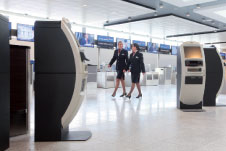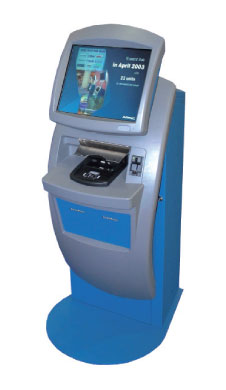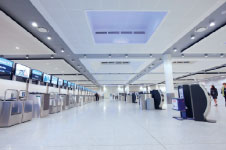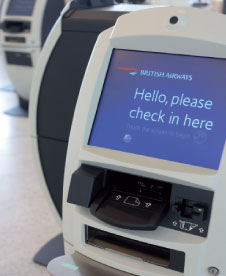
The implementation of the check-in and self-tagging kiosks at London-Gatwick became the first of its kind in the UK to receive a Fast Travel Gold Award from IATA.
Common-use self-service (CUSS) kiosks have become a permanent fixture in airport terminals across Europe over the last decade, but as passengers show an increasing willingness to embrace online and mobile technology to check-in for their flight and retrieve their boarding pass, a new generation of kiosk has emerged.
In the UK, the change has been led by British Airways, which has introduced kiosks that not only allow passengers to check-in, select their seat and print their boarding pass, but also print out and attach their own baggage tags for checked luggage. This means that checked bags can simply be deposited at a bag drop counter upon arrival at the airport. Combined with the ability to check-in online before arriving at the airport, the kiosks are designed to give the passenger more control over their journey and ease congestion in the terminal.
The British flag-carrier initially installed the kiosks in the new North Terminal extension at London-Gatwick Airport last October, and in March the kiosks were also made available at London City Airport.
Referring to the implementation at London City, John Scarff, British Airways Ground Service Manager, said: “At an airport where the unique selling point is a quick and easy journey through the terminal already, this can only improve the customer experience. Many of our customers appreciate the opportunity to do more for themselves, like self-service check-in, choosing seats and printing their own boarding cards – now for the first time they can print their own bag tags. We’re giving them the freedom to be in control, but with the knowledge that our customer service staff will be on hand if they need them.”
According to the airline, the combination of online check-in and self-printing of bag tags means passengers can get from kerbside to airside in 20 minutes, even with checked-in bags.
Versatile airport solutions

ARINC’s common-use self-service kiosk provides an example of how new technology is helping to provide cost-effective solutions to the challenges generated by soaring expenses, growing passenger numbers and ever-changing security requirements.
Whatever the size of their operation, all airports have one thing in common – an ongoing struggle to combat rising costs without compromising operational efficiency. Fortunately, technology is constantly evolving to provide cost-effective solutions to the challenges generated by soaring expenses, growing passenger numbers and ever-changing security requirements.
ARINC has a great deal of expertise in this area. The proven technology, which the company provides across virtually all airport operations, continues to help shape the future of the industry as it has done since ARINC pioneered air-to-ground communications in 1934.
In recent years common-use technology that enables multiple airlines to share computer systems at airport check-in desks and boarding gates has become well established. The next decade will see many airports and airlines moving away from PC-based applications to those hosted in cloud computing environments. The advantages of hosted services include not only lower capital outlay and greater efficiency, but also a reduction in power consumption, space requirements and IT airport costs.
ARINC will continue to exploit the benefits of common-use technology, including thin clients, virtualisation and cloud computing, by designing new systems to meet the ever-changing demands of the industry. At the same time, the company provides a comprehensive service to enhance customers’ legacy solutions, ensuring they are CUPPS (Common-use Passenger Processing System) compliant and certified.
It is all part of the service at ARINC, which has significant experience in delivering reliable, versatile and innovative solutions to improve all airport operations, from baggage management and passenger reconciliation to terminal optimisation and automated turnaround activity.

BA initially installed the new kiosks in the new North Terminal extension at London-Gatwick Airport last October, and in March the kiosks were also made available at London City Airport.
The implementation at London-Gatwick has also been positively received and the initiative became the first of its kind in the UK to receive a Fast Travel Gold Award from the International Air Transport Association (IATA). The Fast Travel initiative consists of six projects designed to offer a range of self-service options that give passengers more control over their journey. These are: check-in, bags ready-to-go, document check, flight re-booking, self-boarding, and bag recovery.
“This award is a great achievement for British Airways at Gatwick and demonstrates our commitment to ensuring that the latest technology is at the forefront of our customer experience worldwide,” said Glenn Morgan, Head of Service Transformation, British Airways. “We are investing in new technology that not only saves our customers time and effort, but also makes their journey more enjoyable.”
Offsite kiosks
Another example of how the latest generation of check-in kiosk is adding value to the travel experience can be found outside of Europe in Abu Dhabi, where Abu Dhabi Airports Company (ADAC) has implemented offsite kiosks, which allow passengers to check-in and print their boarding pass at a kiosk before travelling to the airport.

Scarff: “Many of our customers appreciate the opportunity to do more for themselves, like self-service check-in, choosing seats and printing their own boarding cards – now for the first time they can print their own bag tags.”
The kiosks are available in four locations, including at the Crowne Plaza Abu Dhabi Yas Island Hotel, where a kiosk was installed in June. Similar kiosks are also in place at the Park Rotana Hotel and Abu Dhabi City, while at the Abu Dhabi National Exhibition Centre, bags can be checked-in, before being transported to the airport and reunited with the passenger at the arrival destination.
Harib Al Hameli, Vice President Operations, Abu Dhabi International Airport, said: “ADAC is committed to delivering high-quality experiences for passengers and continuously strives to deliver new initiatives and state-of-the-art facilities, ensuring the highest level of service and standards. The self-service kiosks in hotels across the city allow passengers to manage their own travel plans conveniently and easily, giving them maximum time to enjoy the city and minimising queues at the airport.”
So, although a vast number of passengers are now arriving at the airport already in possession of their boarding pass, there is little to suggest that the kiosk is facing redundancy.
The addition of new features – in particular the capability to print your own bag tags – and the realisation of their usefulness in offsite locations should be enough to guarantee that the kiosk remains an important part of the future travel process.







